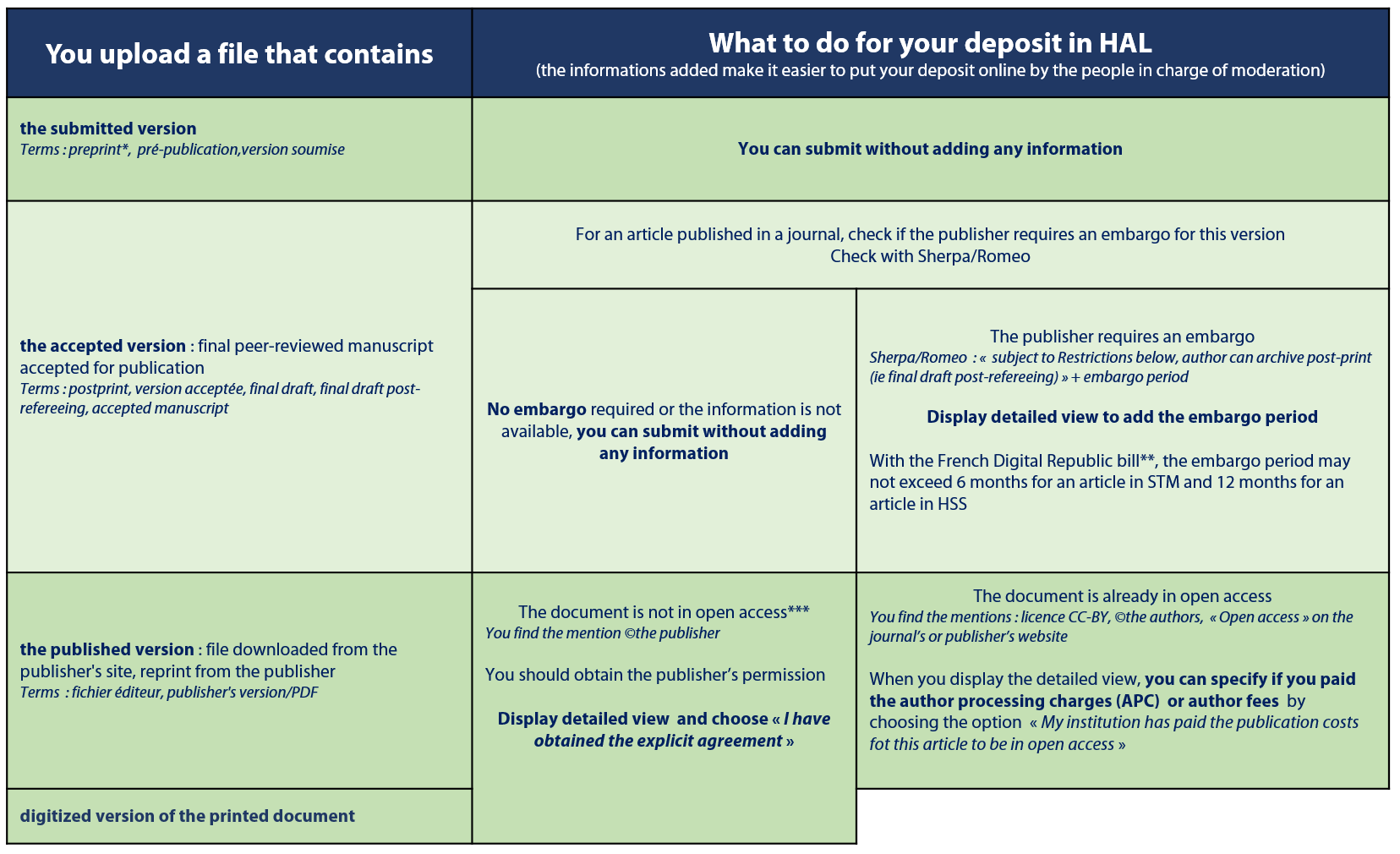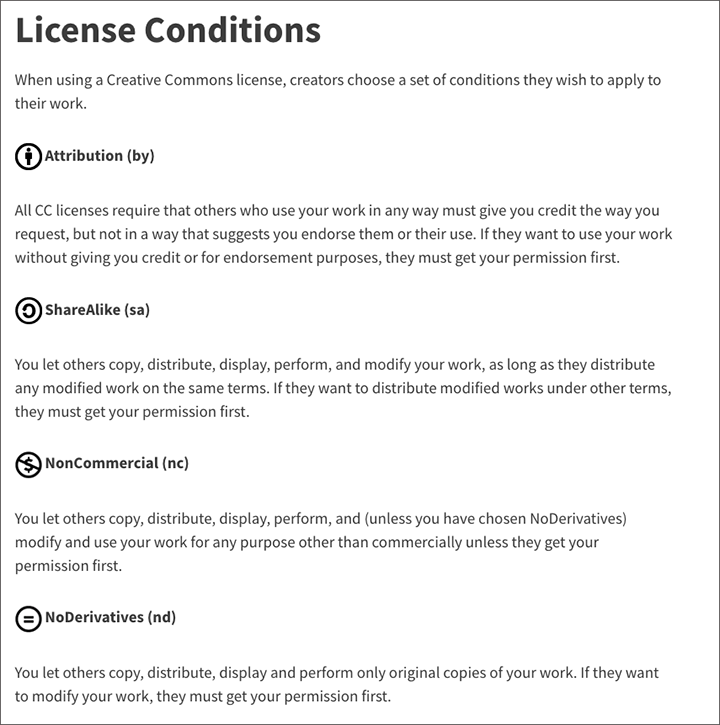Legal aspects
Contributor obligations
Self-archiving must comply with the provisions of Intellectual Property rules and legislation. If the publication has several authors, the contributor must obtain consent from all authors. If the deposit is a published article, the contributor must obtain the publisher’s authorization or check the publisher’s policy if it is made public. Copyright issues cover the published document, but also any of its illustrations (photographs, images, maps, etc.).
The contributor accepts HAL’s conditions :
- He/she grants an authorization to HAL to post and disseminate the deposited document online,
- He/she acknowledges to be aware that deposits that, once accepted, deposits cannot be withdrawn,
- He/she understand that HAL reserves the right to reclassify or discard any deposit.

*Preprint: this is the document version, not a document type. If you deposit the preprint version of a published article, you must choose “Article in a journal”: the title of the journal can thus be completed. The publication type “Preprint / working document” is used for unpublished document.
** French Digital Bill (art 30) : It applies to all scientific writing resulting from a research activity financed at least half from public funds and published in a journal published at least once a year
*** If you downloaded the file from the publisher’s site without paying for it, you can probably do it with the licenses funded by your institute or library (eg recognition of the IP number). This does not mean that the article is freely available.
Where to Find Resources: Sherpa/Romeo, Dulcinea, publisher’s sites
For reviews, many sites index publisher’s archival preferences and restrictions.
- Sherpa/Romeo
- Dulcinea (for Spanish publishers)
- Diadorim(for Brazilian publishers)
These sites are not exhaustive. If you don’t find the information you’re looking for, consult the site of the publisher or contact them directly.
Note: HAL uses the Sherpa/Romeo site references and will link to the relevant page if the review is included on that site.
Embargos
An embargo is a period during which the publisher restricts the diffusion of a document they have published. During this time, a file deposited into an Open Archive is not freely accessible.
If a publisher has imposed an embargo on a document, it may still be deposited into HAL but the embargo period must be added to the document. The file will be visible as a bibliographic record until the embargo has passed, at which point the file will become visible/accessible.
Example: An article is published online June 19 2019 on the publisher’s website. If they have set an embargo for 6 months after publication, the article will not be visible on HAL until 19 December 2019. Even if the article is deposited before that date, the restriction must be respected and enforced by the depositor.
An author has the right to apply an embargo to any of their unpublished works.
“The Law for a Digital Republic” (« Loi pour une République Numérique »)
This is a summary, not an official translation and any questions must refer directly to the text in French (Loi n°2016-1321 du 7 octobre 2016 (art. 30)).
The text of this law makes clear that if research:
- has been funded at least 50% by the French state, territories, public establishments, national finance agencies, or by funds coming from the European Union,
- and it appears in a review published at least annually, then
the author or authors have the right, with the consent of any coauthors, to deposit the resulting research, in the form of the manuscript accepted by a publisher, into an open archive in a digital form.
This can be done from the moment of publication, if the publisher allows, but a publisher’s embargo cannot last more than six months for a publication in the domain of sciences and no more than 12 months for a publication in the domain of human and social sciences.
You are affected if:
- your research is funded at least 50% by the aforementioned sources
- you publish your results in a review which is released at least once per year
What does this law give the author the right to do? Whatever the contract with a publisher might say, the author can deposit the accepted manuscript of their work into HAL as soon as it has been published:
without an embargo if the article is freely available on the publisher’s site with an embargo of no more than 6 months for the sciences, technology, and medicine, and no more than 12 months for human sciences.
This article is again present in the Code de la Recherche, Article L533-4.
Resources: (in French)
- Calimaq, S.I.Lex : Open Access : quelles incidences de la loi « République numérique » ?, blog post, 31/10/2016
- Consortium Couperin, FAQ sur la Loi République Numérique
- Olivia Tambou, Livre blanc sur l’article 30 de la Loi République Numérique (LRN), blogdroiteuropéen, 9/10/2017
- Guide d’application de la loi pour une République numérique(mai 2018)
Creative Commons licences
Creative Commons is a licensing tool that gives an author the ability to easily manage the use of their work. Various licenses can help:
- share and facilitate the use of their work by others
- freely authorize the reproduction and diffusion of the work (under certain conditions)
- accord more rights to users while maintaining those of the author
- help the work to evolve and enriching our common patrimony (common goods or the Commons)
- reducing the costs of transactions
The 4 options create 6 licenses:

CC licenses are non-revocable: if an author decides at any moment to change the terms of their CC license or to revoke it entirely, this change will not be retroactive. Thus, any copies already distributed or in circulation would not be affected.
If multiple authors created a work, always ask all involved for permission before applying a CC license.
When to apply a Creative Commons license
An author can choose to apply a CC license to their work when they wish to deposit an unpublished document that they may not ultimately submit to a publisher.
If a document is already Open Access, the author must add the same license already mentioned on the publisher’s website/published version (normally found on the bottom of the first page).
How to Choose a Creative Commons License
If the author is submitting a document that is already freely accessible, they should verify that no CC license already applies to the work.
- Verify the first page of the publisher’s version of the document:

- Consult the DOAJ (Directory of Open Access Journals)

Some resources:
- Creative Commons site
- Wikimedia explanation
- Open Content – A practical guide to using Creative Commons licences(80 p. PDF)
Choosing a license for software source code
Some resources:
- Open Source Initiative, Open Source Licenses by Category
- GNU Operating system, Licences
Downloading HAL files
While files on HAL are freely available, all authors retain their intellectual property rights. They must be correctly cited and recognized as the creator/author of the document.
Data Harvesting: conditions for using the data
HAL’s metadata can be consulted in whole or in part by harvesting in compliance with the intellectual property code.
HAL does not permit the commercial use of extracted data.
Users must cite the source (example: hal.science.fr/hal-0000000001)